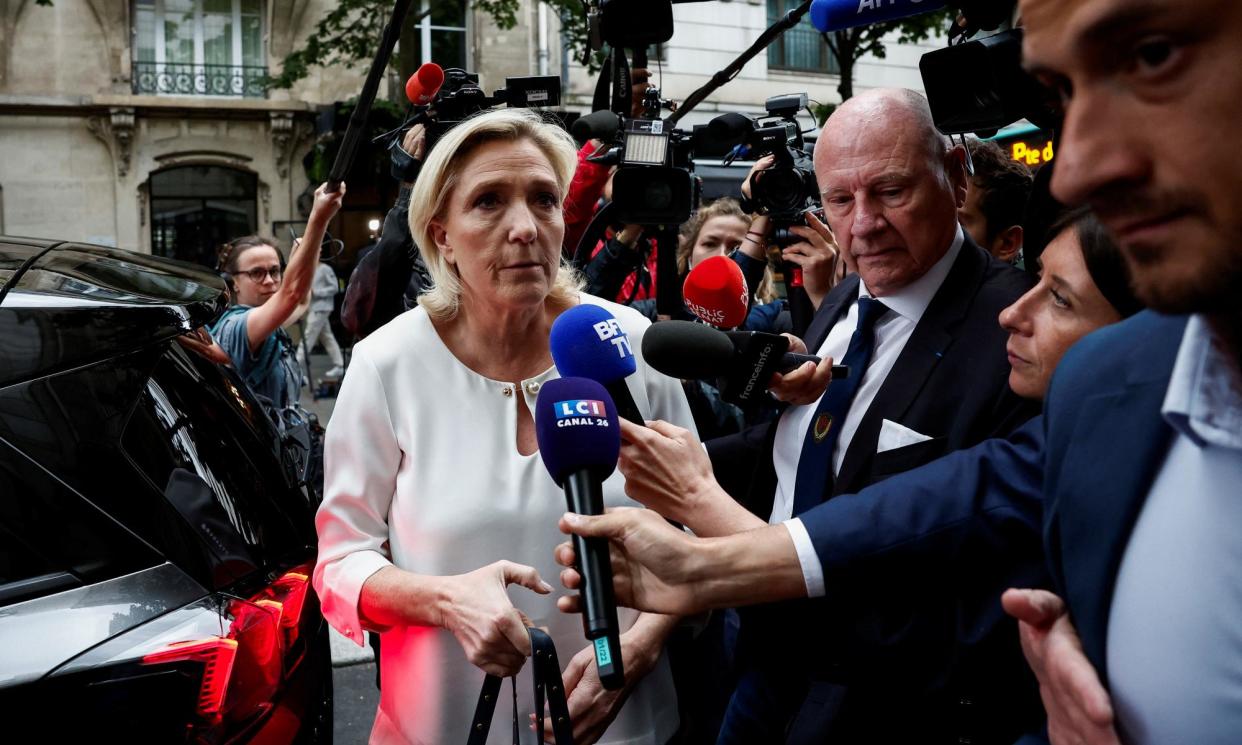French left and centrists scramble to unite against far right for election runoff

France’s left and centrist parties are scrambling to cobble together a united front after Marine Le Pen’s resounding victory in the first round of snap parliamentary elections on Sunday brought her far-right, anti-immigration party a step closer to power.
Le Pen’s National Rally (RN) and its allies on the right finished first with 33% of the vote, followed by the leftwing New Popular Front alliance (NFP) with 28%, while President Emmanuel Macron’s centrist bloc came third with 20% of the vote.
Most of the 577 seats in the national assembly will now be decided in a second-round runoff on Sunday. Rival parties were engaged in frantic bargaining and tactical voting plans on Monday in an attempt to stop the RN’s rise.
The RN is on track to become the dominant party in parliament but the number of its seats is uncertain. Whether it can make the difficult leap to the absolute majority of 289 seats needed to form a government will depend on the political deal-making made by its rivals over the coming days.
In the past, the traditional right and leftwing parties have struck agreements to stand down candidates from the runoffs to avoid splitting the vote against the RN. But the tactical voting strategy known as the “republican front” is less certain than ever.
Related: ‘Not a solution’ – fears grow over prospect of win for far right in France
Leaders of Macron’s centrist alliance and the NFP indicated they would withdraw their own candidates in districts where another candidate was better placed to beat the RN.
In a written statement, Macron called on voters to rally behind candidates who are “clearly republican and democratic”, which, based on his recent declarations, would exclude candidates from the RN and from the France Unbowed (LFI) party of Jean-Luc Mélenchon, which is a key member of the NFP alliance.
But the left said Macron’s position, and that of his centrists, had to be made more clear. A source told Reuters the president had ended a rallying speech to ministers on Monday with the word: “Attack!”
The prime minister, Gabriel Attal, who is likely to be forced to resign after the second round, warned the far right was at the “gates of power” and said the RN should not get a “single vote” in the second round.
In an interview on Monday, Bruno Le Maire, a Macron ally and finance minister, emphatically ruled out urging voters to choose an LFI candidate. “For me, France Unbowed is a danger for the nation, just as the National Rally is a danger for the Republic,” he told France Inter radio.
But Marine Tondelier, a senior member of the Greens within the NFP alliance, told the same radio station minutes later she was “absolutely floored” by Le Maire’s stance, calling it “cowardly and privileged”.
The LFI’s Éric Coquerel accused the centrists of playing into Le Pen’s hands, saying “all those who continue in the former majority to put a line of equality between the LFI and the RN affirm that for them, giving the RN a majority isn’t a problem”.
Jordan Bardella, the RN president who is Le Pen’s protege, published a letter on Monday in which he attacked the LFI and said his party would mobilise voters in the second round by focusing on spending power and helping people make ends meet.
Most of the letter was given over to what Bardella calls the dangers of the LFI’s Mélenchon. Mélenchon is a divisive personality in France, but other key figures on the left said on Monday morning that he should not be the focus of the final round as he is not a candidate for prime minister.
Bardella, who will be prime minister if the RN wins an absolute majority on Sunday, said the left were “agents of chaos” who posed an “existential threat to the French nation”. He said the RN would, in contrast, bring “order to the streets” and to the public purse, and would address the cost of living crisis as well as concerns over security, health, education and immigration.
Bardella has said he will only become prime minister if his party wins an absolute majority. He has ruled out trying to form a minority government and neither Macron nor the NFP group will form an alliance with him.
“I will be a ‘cohabitation’ prime minister,” he said, referring to the fact that Macron would remain president. He said he would be “respectful of the constitution and of the office of president of the republic, but uncompromising about the policies we will implement.”
Amid the fractious aftermath of the vote, some called for a committed, unequivocal and non-partisan response to the “catastrophe” of a RN government.
Raphaël Glucksmann, who headed the Socialist party’s candidates in the European elections last month, called for all the candidates who finished third on Sunday to withdraw in order to forge a united barrier against the far right.
“Are we ready to hand over our country – the country of Victor Hugo, of Voltaire, of Rabelais – to the Le Pen family?” he asked.
“That’s the only question that matters. It’s become a referendum and that’s why we’re asking all the third-place candidates to withdraw immediately, and why we’re asking people to vote, unambiguously and unhesitatingly, for democratic republicans whether they be on the left or the right, in order to stop the National Rally. We have seven days to avoid a catastrophe the likes of which France has never known in its history.”
Reuters and Agence France-Presse contributed to this report

 Yahoo News
Yahoo News 
